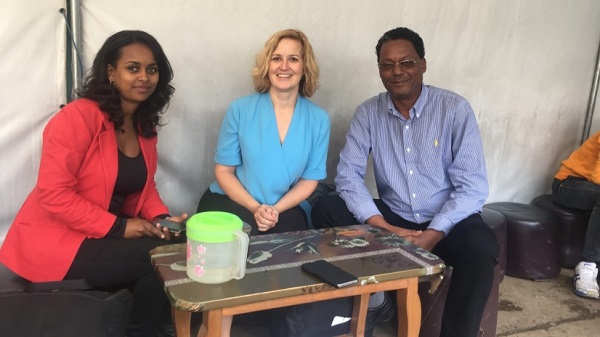
We learned how to adapt cancer research and treatment in under-resourced environments, says Olivia Bouchard, a U-M graduate student who spent the summer in Ethiopia.
By Mandira Banerjee (Global Michigan)
ADDIS ABABA– Inside Bereket Woldeab’s office at Ethiopia’s Public Health Institute in Addis Ababa, two things stand out in an otherwise bare room. One is the impressive microscope on top of the desk. The other is the plethora of black hardcover files stacked everywhere.
These black files contain more than 14,000 handwritten notes and pathology reports regarding the health status of cancer patients—their tumors, diagnoses, treatments, progress and other details. Now, thanks to a project with the University of Michigan School of Public Health (U-M SPH), these hand-written files are finding a place in a streamlined online database that can be used for research, look for patterns and assist public health officials with better information that is used in the management of cancer and ultimately, cures.
Two students from the U-M SPH spent the summer in Ethiopia’s capital transferring this massive pool of information into an international format that is provided and supported by the university.
The project grew out of a chance meeting between Bereket and cancer researcher Laura Rozek, associate professor of public health and director of U-M’s Global Cancer initiative. Rozek was in Addis Ababa with her two students when she ran into Woldeab on the street outside the institute. Her students’ internship had just fallen through.
“I asked Woldeab if he had a project for the students,” Rozek said.
Bereket Woldeab immediately agreed.
“They started something that we needed but didn’t have,” Bereket said.
A Closer Partner
Bereket, an Eritrean, arrived in Ethiopia a decade ago fleeing political persecution in his home country. Today he heads the pathology laboratory for St Paul’s Hospital and hopes that this database will help them to better understand the cancer burden in Ethiopia.
“This will become the benchmark on how to do a standard pathology report,” he said.
U-M graduate students Claudia Djimandjaja and Olivia Bouchard spent countless hours importing and “cleaning” data in Bereket’s department in northwest Addis Ababa. As part of their work, Djimandjaja and Bouchard also navigated the city’s kebeles, Addis Ababa’s small neighborhoods and shanty towns, jostling blue taxis. They visited local residents to collect samples and design a better way to perform cervical cancer screenings.
Read the complete story at Global Michigan
——
See also:
- CIRHT: Ethiopia-Michigan Collaboration on a Global Scale
- A New Cancer Treatment Center to Be Inaugurated at Haramaya University
- VIDEO: The Mandela Washington Fellowship (MWF) 2017: Ethiopian Fellows
- HEALTH: Breast Cancer Replaces Cervical Cancer as Top Women Illness in Ethiopia
- The Pediatric Cancer Unit at Jimma University Specialized Hospital Treated More than 100 Children with Cancer
